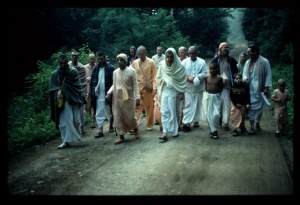CC Madhya 24.190 (1975): Difference between revisions
(Vanibot #0027: CCMirror - Mirror CC's 1996 edition to form a basis for 1975) |
(Vanibot #0020: VersionCompareLinker - added a link to the Version Compare feature) |
||
| Line 2: | Line 2: | ||
<div style="float:left">'''[[Sri Caitanya-caritamrta (1975)|Śrī Caitanya-caritāmṛta (1975)]] - [[CC Madhya (1975)|Madhya-līlā]] - [[CC Madhya 24 (1975)|Chapter 24: The Sixty-One Explanations of the Atmārāma Verse]]'''</div> | <div style="float:left">'''[[Sri Caitanya-caritamrta (1975)|Śrī Caitanya-caritāmṛta (1975)]] - [[CC Madhya (1975)|Madhya-līlā]] - [[CC Madhya 24 (1975)|Chapter 24: The Sixty-One Explanations of the Atmārāma Verse]]'''</div> | ||
<div style="float:right">[[File:Go-previous.png|link=CC Madhya 24.189 (1975)|Madhya-līlā 24.189]] '''[[CC Madhya 24.189 (1975)|Madhya-līlā 24.189]] - [[CC Madhya 24.191 (1975)|Madhya-līlā 24.191]]''' [[File:Go-next.png|link=CC Madhya 24.191 (1975)|Madhya-līlā 24.191]]</div> | <div style="float:right">[[File:Go-previous.png|link=CC Madhya 24.189 (1975)|Madhya-līlā 24.189]] '''[[CC Madhya 24.189 (1975)|Madhya-līlā 24.189]] - [[CC Madhya 24.191 (1975)|Madhya-līlā 24.191]]''' [[File:Go-next.png|link=CC Madhya 24.191 (1975)|Madhya-līlā 24.191]]</div> | ||
{{CompareVersions|CC|Madhya 24.190|CC 1975|CC 1996}} | |||
{{RandomImage}} | {{RandomImage}} | ||
==== TEXT 190 ==== | ==== TEXT 190 ==== | ||
| Line 13: | Line 12: | ||
:strī-śūdra-hūna-śabarā api pāpa-jīvāḥ | :strī-śūdra-hūna-śabarā api pāpa-jīvāḥ | ||
:yady adbhuta-krama-parāyaṇa-śīla-śikṣās | :yady adbhuta-krama-parāyaṇa-śīla-śikṣās | ||
:tiryag-janā api | :tiryag-janā api kimu śruta-dhāraṇā ye | ||
</div> | </div> | ||
| Line 20: | Line 19: | ||
<div class="synonyms"> | <div class="synonyms"> | ||
te—all of them; vai—certainly; vidanti—understand; atitaranti—cross over; ca—also; deva-māyām—the influence of the external illusory energy; strī—women; śūdra—fourth-class men; hūna—uncivilized hill tribes; śabarāḥ—and hunters; api—even; pāpa-jīvāḥ—sinful creatures; yadi—if; adbhuta-krama—of the performer of wonderful activities; parāyaṇa—of the devotees; śīla-śikṣāḥ—characteristics and education; tiryak-janāḥ—birds and beasts; api—even; | te—all of them; vai—certainly; vidanti—understand; atitaranti—cross over; ca—also; deva-māyām—the influence of the external illusory energy; strī—women; śūdra—fourth-class men; hūna—uncivilized hill tribes; śabarāḥ—and hunters; api—even; pāpa-jīvāḥ—sinful creatures; yadi—if; adbhuta-krama—of the performer of wonderful activities; parāyaṇa—of the devotees; śīla-śikṣāḥ—characteristics and education; tiryak-janāḥ—birds and beasts; api—even; kimu—what to speak of; śruta-dhāraṇāḥ ye—persons advanced in the education of Vedic knowledge. | ||
</div> | </div> | ||
| Line 27: | Line 26: | ||
<div class="translation"> | <div class="translation"> | ||
" 'Women, fourth-class men, uncivilized hill tribes, hunters and many others born of low families, as well as birds and beasts, can engage in the service of the Supreme Personality of Godhead-who acts very wonderfully-and follow the path of the devotees and take lessons from them. Although the ocean of nescience is vast, they can still cross over it. What, then, is the difficulty for those who are advanced in Vedic knowledge?' | |||
</div> | </div> | ||
Latest revision as of 15:18, 27 January 2020

A.C. Bhaktivedanta Swami Prabhupada
TEXT 190
- te vai vidanty atitaranti ca deva-māyāṁ
- strī-śūdra-hūna-śabarā api pāpa-jīvāḥ
- yady adbhuta-krama-parāyaṇa-śīla-śikṣās
- tiryag-janā api kimu śruta-dhāraṇā ye
SYNONYMS
te—all of them; vai—certainly; vidanti—understand; atitaranti—cross over; ca—also; deva-māyām—the influence of the external illusory energy; strī—women; śūdra—fourth-class men; hūna—uncivilized hill tribes; śabarāḥ—and hunters; api—even; pāpa-jīvāḥ—sinful creatures; yadi—if; adbhuta-krama—of the performer of wonderful activities; parāyaṇa—of the devotees; śīla-śikṣāḥ—characteristics and education; tiryak-janāḥ—birds and beasts; api—even; kimu—what to speak of; śruta-dhāraṇāḥ ye—persons advanced in the education of Vedic knowledge.
TRANSLATION
" 'Women, fourth-class men, uncivilized hill tribes, hunters and many others born of low families, as well as birds and beasts, can engage in the service of the Supreme Personality of Godhead-who acts very wonderfully-and follow the path of the devotees and take lessons from them. Although the ocean of nescience is vast, they can still cross over it. What, then, is the difficulty for those who are advanced in Vedic knowledge?'
PURPORT
This is a quotation from Śrīmad-Bhāgavatam (SB 2.7.46). Lord Brahmā said this when speaking to his disciple Nārada about the wonderful characteristics of Lord Viṣṇu. Simply by chanting the glories of Lord Viṣṇu, one can cross the ocean of nescience, even though one may be lowborn.